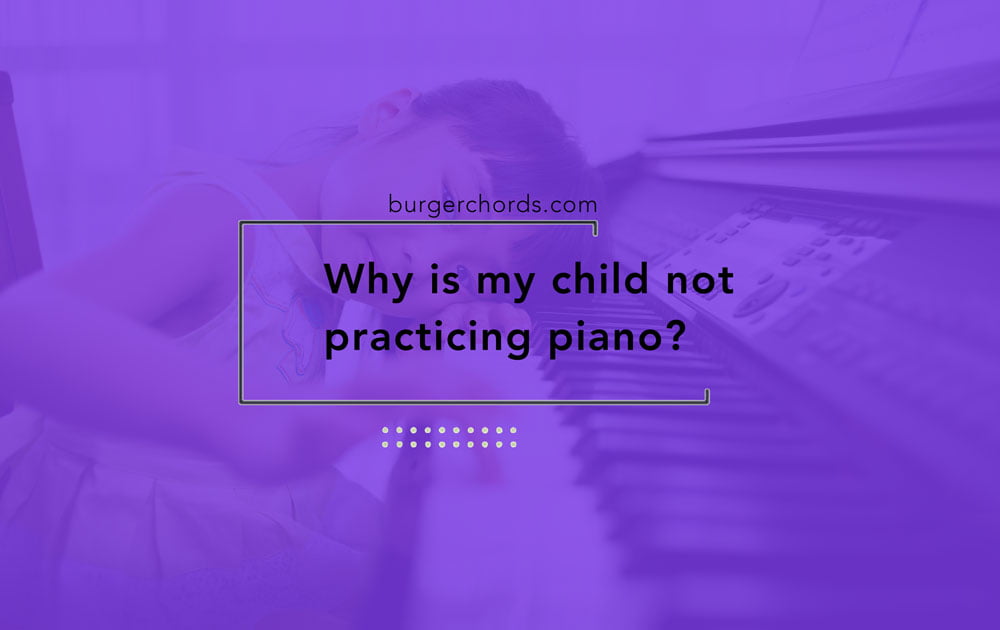

Attending weekly piano classes is one thing, but practicing is a whole other ball game! If you’re a parent with a child who won’t practice piano, here are some common reasons I’ve encountered. Of course though, every child is different. Rather than generalising the experience, this article hopes to provide some pointers to help you and your child on your musical adventures.
1. Not practicing because of…Boring songs
Learning to play a musical instrument takes a really long time. There’s no sugar-coating that fact. While a music teacher can motivate, inspire, and guide the learning process, the only path to success is time spent playing, and the persistence to keep doing it regularly. In other words, there’s no instant gratification with piano lessons. A funny line I’ve read from journalist Alan Attwood, who quoted his own piano teacher: “If you want instant gratification, eat chocolate. Don’t take up a musical instrument.”
For this reason, I find it important for students to choose their own songs and actually enjoy what they’re playing. Getting to the piano each day is certainly a challenge that requires discipline for anyone at any age. If the student likes their songs, it makes this discipline a bit easier to exercise day in and day out. If your child is refusing to practice out of boredom, you could ask the teacher to try different pieces.
This also applies to piano students who are preparing for exam grades. Let your child pick their own pieces, and get them to learn a variety of songs. Not just the essential few pieces they need for the exam. For some certificates, exam boards like AMEB and Rockschool allow students to pick an “own choice” piece. This could be any piece outside the syllabus — even an own arrangement or an original song. So really, there’s no reason to limit students to pieces they’re bored with. Encourage your child and piano teacher to try some new ones!

2. Not practicing because of…Unreasonable expectations
Sometimes, your child’s expectations don’t match with the time and effort spent practicing. In my experience, I’ve met students who have very high expectations of themselves. Since learning a musical instrument is a slow process, a bump in the road can feel like failure. If your child is avoiding the piano for this reason, I think a gentle nudge is helpful. For parents, it’s good to remind your child that they’re not expected to “nail it” every week, or straight away, or ever even! Music is highly subjective after all.
At home, it’s useful not to comment on wrong notes, their skill or progress during or after their practice. It’s also worth speaking to the teacher about helping your child to self-assess their learning in order to set reasonable goals for their playing.
For parents, it can also help to get involved in your child’s lessons. One way is to sit in during their lessons. Another way is to learn yourself! You can enrol in group or dyad lessons with your child and learn together. Either way, participation gives you a valuable understanding of your child’s learning to help set better expectations.
3. Not practicing piano because of…Shyness
For very shy kids, practicing the piano at home can feel like a cringe-worthy public performance in front of the family. Your child may want to play and practice, but they might be avoiding it because they feel uncomfortable playing loudly or while there are other family members around.
A great way to help a shy player is with a digital piano. Your child can plug in headphones and practice to their heart’s content without anyone hearing it. If you can, dedicating a quiet space to be a music room or corner may also help your child approach the piano more comfortably.
If you have an acoustic piano at home, you can see if your child will play along with backing tracks. Ask if your teacher has Mp3s handy, or simply switch on YouTube or Soundcloud. Set up speakers by the piano and your child can jam along with the recordings. Having more sound helps to shift the attention away from just the one player in the room. And it’s fun to play along with your fave tracks!
Unsure if your child is ready for piano lessons? Read the signs here >
4. Not practicing because of…Too many things on their plate
All piano students need to play and practice regularly in between lessons. For beginner kids, I’d say the minimum is 15 minutes a day. While this doesn’t seem like much, it can be an impossible task for a child that is juggling a billion other things. For busy students, I find that keeping a weekly practice journal is helpful. This way, students can note down how much practice they’ve done during the week and be accountable for their own time.
However, if your child does many extra-curricular activities, they may be struggling to find the energy to play piano on a daily basis. If your child is struggling to practice at home, it’s worth asking whether they want to create the necessary time for music. If they don’t, that’s totally OK! There’s no reason to continue lessons if they can do something else that they love and enjoy more!
5. Not practicing because of…Not wanting to play piano
If your child has given piano lessons a go and doesn’t seem interested in it, then I’d say to give lessons a break. Music, while demanding and rewarding, is a voluntary activity.
My totally lax view on attending lessons stems from my year 12 English teacher. For our important final school year, my English teacher never forced us to attend class or do any of our assigned work. He told us that he didn’t want to teach anyone who didn’t want to be there. If we wanted to do something else, then we should go do that something else instead. This seemed like trouble in a room of 30 angsty teenagers, but it was a gamechanger. I felt a real sense of ownership for my own learning, and books and writing became fun again rather than a compulsory burden.
If your child is not practicing because they don’t want to play piano, then it’s worth taking a break from lessons. Here, semantics can be important — your child isn’t “quitting” piano lessons. There’s always the option of resuming lessons again in the future if they want.
Ready to try a piano lesson?
6. Not practicing piano because of…Forgetting notes
Sometimes, students play fine with the support of their teacher at the lesson but struggle on their own at home. This can be for a number of reasons, but I find that often it comes from a lack of confidence rather than forgetfulness. Learning and practicing a new technique means a lot of odd or “wrong” notes played, and awkward or slow fingers. This can deter students who are feeling unsure of themselves. Rather than committing themselves to fudging their notes over and over, uncertain students may avoid practicing altogether.
To help your child feel more confident at the piano at home, it helps to check in with your child directly after their lesson. Ask them to summarise or teach you what they did during the lesson. Also, ask if they need to scribble anything down on their music or practice diary to help them remember what they need to play without their teacher.
Teachers can also provide backing tracks or record what the student needs to play during the week, so your child can play it back at home.
The other important thing to do is to continually encourage your child to simply try. There’s no such thing as a wrong note in music. If they don’t believe this, you can ask them to listen to free-form jazz!
The key to good piano practice? Take a break!
You can spend your whole life learning a musical instrument! Therefore, to sustain a lifetime of learning, breaks are a must!
In the past, I’ve taught piano throughout the school holidays. My thinking was: there’s no reason for a private piano teacher to be limited by arbitrary school terms. But nowadays, I don’t teach over those term holidays. I’ve come to realise that those short breaks help to reinvigorate not only my student’s practice, but also my own!
Our brains need time to marinate and digest all the stuff we’re trying to cram into it. So while it’s worth checking in to find out why your child is not practicing piano, it’s also good to take a breather from the routine too.

About the piano teacher
Michelle is a freelance pianist and piano teacher who aspires to make music fun and accessible for anyone who wants to play. She’s been playing and teaching piano to kids and adults for over a decade, and brings good vibes playing piano for weddings and events at Michelle Plays Piano.
Michelle also plays drums in post-punk and indie bands around Melbourne, and has written about bands for The Music and EARMILK. When she’s not obsessing over music, she’s probably thinking about food.




1 Comment
[…] Struggling to get your kids to practice their AMEB piano songs? Here’s why > […]